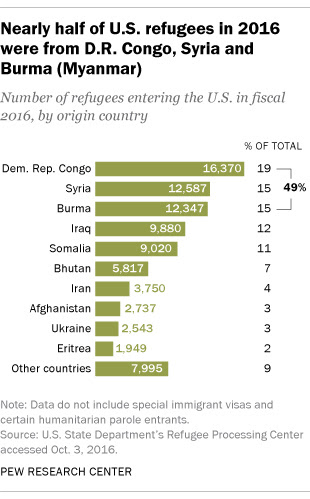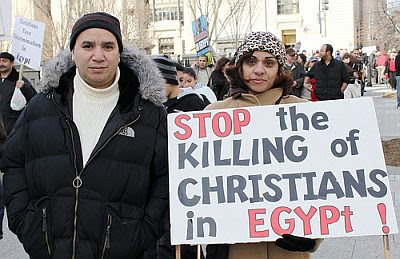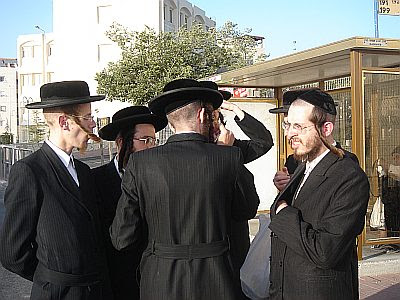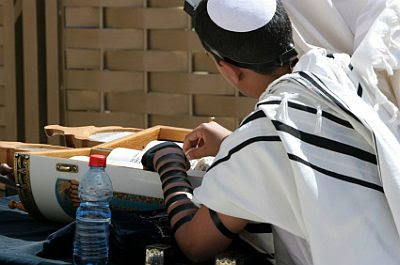Jerusalem skyline
"Then you will be handed over to be persecuted and put to death, and you will be hated by all nations because of Me.” (Matthew 24:9) When Yeshua (Jesus) was asked by His disciples about the end times and the sign of His coming, He prophesied that there would not only be wars, famine and earthquakes, but that persecution would increase, especially as His return approached. (Matthew 24) It seems that today, this prophecy is in the midst of being fulfilled! In fiscal year 2016, over 90,000 Christians were murdered for their faith and 500–600 million were otherwise persecuted in such ways as imprisonment, abductions, economic restrictions, destruction of property and loss of personal rights.
Pakistani Christians kneel in prayer during a march to Downing Street, London. They were protesting the use of blasphemy laws in Pakistan to persecute Christians and other minorities. Pakistani law mandates punishment for those who "blaspheme" the Qur'an.
The statistics may surprise those who live relatively peaceful lives in North America, since the media seldom reports on this issue. Yet, some groups are paying attention. The director of the Turin-based Center for Studies on New Religions (CENSUR), Dr. Massimo Introvigne, told Breitbart News that Christians are the most targeted religious group in the world, and for two primary reasons: “First because their proclamation of peace disturbs more belligerent groups; and second, because their social teachings on life, family and poverty are opposed by powerful forces.” "Blessed are you when people insult you, persecute you and falsely say all kinds of evil against you because of me." (Matthew 5:11)
Church courtyard in Bethlehem
The Compromise of Religious Freedom in the West
"Let us hold unswervingly to the hope we profess, for he who promised is faithful." (Hebrews 10:23) In the United States, the value placed on religious freedom seemed to be in decline in recent years, which may have diminished the will to respond to persecution in communities around the globe. In 2012, for instance, the US State Department removed sections covering religious freedom from the annual Country Report on Human Rights Practices—the Human Rights Report. According to former US diplomat Thomas Farr, this reflected efforts by the Obama administration to downgrade issues of religious freedom, and to “edge traditional religious ideas out of the public sphere, both domestically and in foreign policy." (Weekly Standard)
He noted that this was extremely short-sighted since religious freedom and democracy are correlated.
“Both history and social science make it clear that highly religious nations like Egypt and Pakistan will not achieve stable democracy unless they embrace religious freedom in full. Nor will they be able to defeat the toxic religious ideas that feed violent Islamist terrorism, including the kind that has reached American shores,” he said. Let us not forget the thousands of innocent people massacred on 9/11 in the name of Allah. “This was not a natural disaster. It was caused by radical Islamists,” said Carlo Notaro during a memorial service in honor of his daughter Daniela Rosalia Notaro who died at the World Trade Center. Widespread Islamophobia seems to be one backlash of 9/11. Consequently, in America and in Europe, nearly 1.5 million Muslim refugees since 2015 have become the new cause for human rights groups. In their efforts to secure rights for Muslim immigrants and refugees, accusations of hate crimes against them abound.
9/11: the remains of the World Trade Center
The FBI defines a hate crime as a "criminal offense against a person or property motivated in whole or in part by an offender’s bias against a race, religion, disability, sexual orientation, ethnicity, gender or gender identity.” In the West, even bacon can be a medium for hate. At a Ramadan event (Ramadan is holy month in Islam), at the New Dorp high school football field in New York a few years ago, Muslims reported to the police and media that—bacon—(yes, bacon), had been discovered lying on the ground. According to the Quran, Muslims are not allowed to eat pork. Unbelievably, the police were called in to investigate this act of littering as a hate crime against Muslims. “The Ramadan event had been organized by a local chapter of the Muslim American Society. However, the Muslim American Society is a front for the Muslim Brotherhood, and some of its chapters have called for the murder of Jews. “Calling for the murder of Jews however falls under freedom of speech. Unlike bacon which is a hate crime,” Daniel Greenfield said (Gatestone Institute).

The New Sheriff Has Arrived
Routing for the underdog could be the underlying reason President Trump's temporary travel ban on seven nations was overturned by the most liberal court in the US—the 9th District Court of Appeals. And the second has also been blocked. The goal of the ban, Trump says, is not hate but rather the implementation of wise vetting procedures to prevent hate, especially from the entry points of the nations that produce the most dangerous terror agents: Iran, Somalia, Sudan, Yemen, Syria and Libya. Thirty percent of refugees admitted to the US in 2016 came from three of these nations: Iran, Somalia, and Syria—without strong vetting procedures, the White House says.

Boko Haram and Fulani: Purging Nigeria of Christians. Since 2000, the Islamist terror group Boko Haram murdered over 14,000 Nigerian Christians and has pledged their support to Islamic State (ISIS). In the last three months of 2016 another group, the Fulani herdsman, murdered 808 people and wounded 57 (both Christians and moderate Muslims), burned down 53 villages, including 1,422 houses and destroyed 16 churches. (Open Doors) While these two groups are private, social and economic pressure against Christians from the government makes it difficult for Christians to survive. Open Doors, an advocacy group for persecuted Christians worldwide, knows of ten Christians who converted to Islam in order to receive government grants to start businesses and be able to meet living needs. One such convert said, “Before my conversion I could hardly see food to eat or money to solve the basic needs of my family, but now we have enough.” (Open Doors)

Coptic Christians in Egypt
It is believed that the Egyptian Church has existed since the Apostle Mark first evangelized Egypt in AD 42. The first Christians spoke Coptic, a late form of Egyptian with Greek adaptations. Today, the Coptic Orthodox Church is the largest Christian church in Egypt, as well as in the Middle East and Northeast Africa. Coptic Christians were the majority in Egypt until 1453, but now make up 10% of Egypt's population (about 9 million people). Even though Egypt did not make the Trump travel ban list, that does not mean that Christians are safe in Cairo or anywhere else in the nation. A bomb in December during mass at the women's hall in St. Peter's Cathedral in Cairo killed 24 people, mostly women and children. This was not the first attack against Christians and won't be the last. Christians feel the violence is escalating and are protesting for protection from Egypt's President Abdel Fattah el-Sisi. Though persecution persists in Egypt, perhaps the nation must be applauded for the fact that so many Christians still remain in this nation, in contrast to other nations of the region.
The Failure of Nations: The Exile of Jews
"Rulers persecute me without cause, but my heart trembles at your word." (Psalm 119:161) Manuel Valls, the French Prime Minister stated after the massacre at a kosher supermarket in Paris in 2015, “If 100,000 Jews leave, France will no longer be France. The French Republic will be judged a failure.” He is correct, and yet throughout the Middle East, once thriving communities of Jews have dwindled to near extinction, as in Egypt and Iran.
Egypt
Egypt had a once large, thriving Jewish community numbering 75–80,000 in 1948 when Israel became a nation. At that time, the government sequestered land and issued one way tickets to Egypt's Jews. Years of Muslim nationalism effectively pushed out all Jews except a handful of women over 80 who remain in Cairo, and their spiritual leader Magda Haroun, who is in her sixties.
According to legend, the Ben Ezra Synagogue in Cairo, also called the El-Geniza Synagogue is located on the site where Moses was found as a baby. synagogue was purchased in AD 882. In the 19th century, the synagogue's treasure trove of 210,000 Jewish manuscripts were brought to Cambridge University and the University of Manchester.
Iran
Biblical Persia (today's Iran) once hosted Queen Esther and Mordecai, and many thousands of Jews who did not return to Israel once their exile officially ended in the 6th Century BC. At the time of Israel's rebirth in 1948, 140,000–150,000 Jews remained in Iran with only about 10,000 today. That's down 50,000–10,000 from five years ago. Persian Jews continue to emigrate to Israel, the haven of hope for Jews since the Holocaust ended. At the same time, the Iranian government regularly sponsors a Holocaust denial conference and has created a 9-point plan for Israel's destruction.
Israel
One might think that Israel would be the beacon of safety and security for persecuted Jews around the world.
With its extreme intelligence capabilities and military ingenuity, it often is. Yet, every neighbor Israel has would like to see it disappear from the face of the earth. The stated goal of Palestinian leaders in Judea-Samaria ("West Bank") and in Gaza, for example, is to reclaim the land of Israel from the Jordan River to the Mediterranean Sea as Muslim territory. As well, lone terrorists from these territories take the lives of innocent Israelis and wound hundreds every year toward that goal. There will be no true safety in Israel until Messiah comes.

We have only scratched the surface of the recent persecution that Jews and Christians are facing. Comparatively speaking, Jews and Christians have been blessed in the American continents, but Matthew 24 reveals that there will be a time when tribulation will be widespread. Yeshua warns us through several parables to be ready, not just physically but most importantly, spiritually. "Blessed is that servant whose master returns and finds him doing his job." (Matthew 24:46) We each have a job to do on this earth.










 Torah scroll
Torah scroll Tourists overlooking the Temple Mount from the Mount of Olives.
Tourists overlooking the Temple Mount from the Mount of Olives. Torah scrolls are stored in this elaborate Aron Kodesh (Holy Ark) in a synagogue in Safed, Israel.
Torah scrolls are stored in this elaborate Aron Kodesh (Holy Ark) in a synagogue in Safed, Israel. The Tabernacle in the Wilderness, 1890 Holman Bible illustration
The Tabernacle in the Wilderness, 1890 Holman Bible illustration The Shabbat, which is kept diligently by ultra-Orthodox Jews, is a festivel day that offers opportunity for prayer, reading of the Hebrew Scriptures, and spending time with the family.
The Shabbat, which is kept diligently by ultra-Orthodox Jews, is a festivel day that offers opportunity for prayer, reading of the Hebrew Scriptures, and spending time with the family. A Jewish boy is ready to give his best gift to charity by depositing his coins in the pushka (offering box).
A Jewish boy is ready to give his best gift to charity by depositing his coins in the pushka (offering box).
 A bronze lepton is estimated to have been worth about six minutes of a day’s wage. The term lepton has survived in Greece to this very day, it is 1/100 denomination of the official currency.
A bronze lepton is estimated to have been worth about six minutes of a day’s wage. The term lepton has survived in Greece to this very day, it is 1/100 denomination of the official currency. Women praying at the Western (Wailing) Wall in Jerusalem
Women praying at the Western (Wailing) Wall in Jerusalem Young Jewish men read from the Torah scrolls at the Western (Wailing) Wall in Jerusalem.
Young Jewish men read from the Torah scrolls at the Western (Wailing) Wall in Jerusalem. Model of the Tabernacle in Timna Park, Israel
Model of the Tabernacle in Timna Park, Israel Preparing to read from the Torah scroll in a synagogue in Israel
Preparing to read from the Torah scroll in a synagogue in Israel Orthodox Jewish men walking on a road next to the surrounding wall of the Old City of Jerusalem.
Orthodox Jewish men walking on a road next to the surrounding wall of the Old City of Jerusalem. A Jewish man wearing a tallit (prayer shawl) and tefillin (phylacteries) reads from a Torah scroll at the Western (Wailing) Wall in Jerusalem.
A Jewish man wearing a tallit (prayer shawl) and tefillin (phylacteries) reads from a Torah scroll at the Western (Wailing) Wall in Jerusalem. Israeli youth
Israeli youth there is still so much work to be done. We ask that you partner with us today to help us produce the Messianic Prophecy Bible. "If you follow my decrees and are careful to obey my commands, 4I will send you rain in its season, and the ground will yield its crops and the trees their fruit." (Leviticus 26:3–4)
there is still so much work to be done. We ask that you partner with us today to help us produce the Messianic Prophecy Bible. "If you follow my decrees and are careful to obey my commands, 4I will send you rain in its season, and the ground will yield its crops and the trees their fruit." (Leviticus 26:3–4)